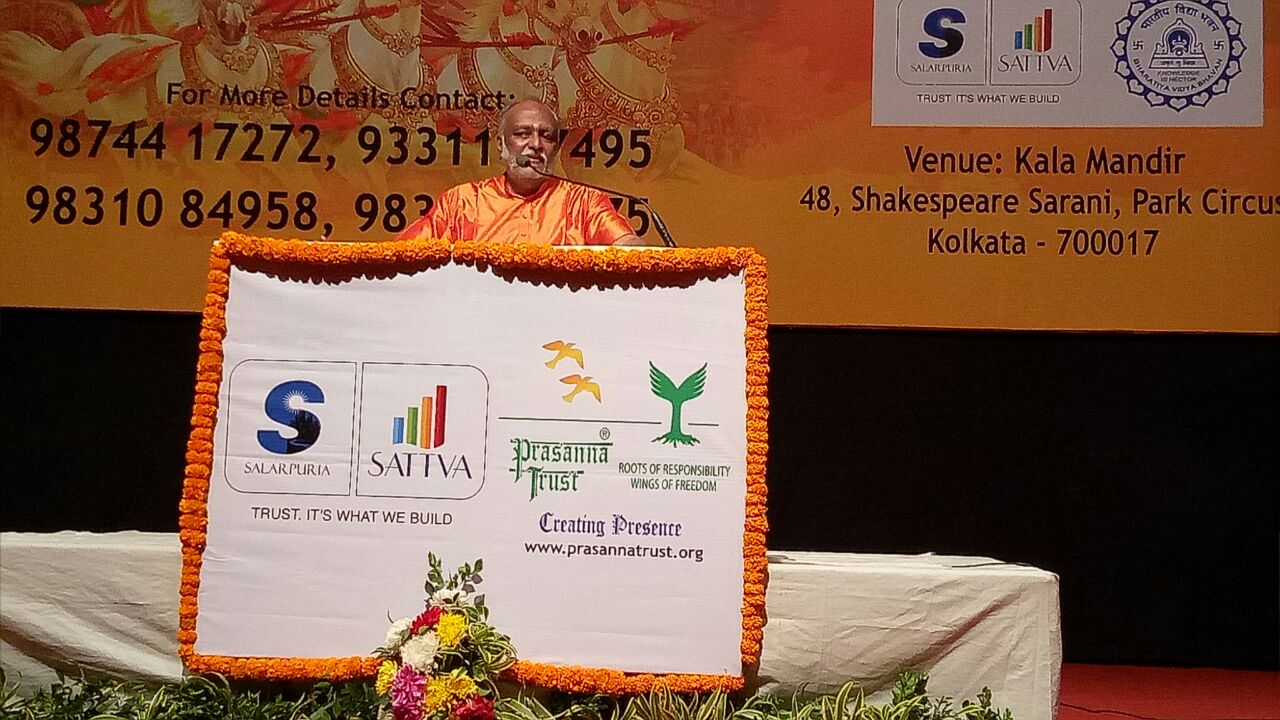Swami Sukhabodhananda Gives Discourse on ‘Personal Excellence Through – Bhagavad Gita’
Kolkata: Bharatiya Vidya Bhavan Kolkata Kendra in collaboration with The Salarpuria Sattva Group hosted two-day Talks on ‘Personal Excellence Through – Bhagavad Gita’ by Swami Sukhabodhananda of Prasanna Trust.
The talk was being held at Kala Mandir Hall in Kolkata on 9th and 10th February, 2018.
Through the talks Swami Sukhabodhananda explained how one can attain excellence in their lives following instances of Bhagavad Gita. In his discourse, Swami Sukhabodhananda brought up topics like ‘Problematic Mind’, ‘Logic of Mystics’, ‘Revel in Inner Void’ amongst various others.
Dr. G V Subramanian, Director, Bharatiya Vidya Bhavan, Kolkata Kendra, said “Bharatiya Vidya Bhavan, as an educational institute is committed to provide holistic education to all. We are extremely happy to have Swami Sukhabodhananda who shared his valued words on how to attain betterment in life through instances from Bhagavad Gita.”
Talking about Problematic Mind, he said –
What is this problematic mind? If you start looking at it clearly, if you really start looking with understanding, you will find that there is no such thing as a problematic mind. It is your assumption that the problem exists. And because of this assumption, we are really trapped. Mind is the cause of bondage, and it is also the cause of freedom; mind is the only cause of Bandha (bondage) or Moksha (release). And therefore, we have to see whether our life is really in bondage or not. The more we start looking with understanding and awareness at it, the more will be our realisation that our life is not bound, but that it is free. It is our delusion that life is bound, and it is this delusion that keeps us really bound.
In a village a person was selling fish. On the sign board he wrote, “Fresh fish sold here.” One passer-by said, “Why have you written ‘Fresh fish sold here?’ No one sells stale fish. So the word ‘fresh’ is superfluous, rub it off.” The fish seller thought it right, took a brush and wiped off the word “fresh” and now looked at the board. The sign said, “Fish Sold Here.” He was happy.
Another passer-by saw the board and asked, “Why the word ‘sold?’ Nobody gives fish as ‘dana’ – every one sells fish and the very fact you opened a shop clearly shows that it is for sale. Therefore, the word ‘sold’ is superfluous.” This time also the fish seller thought it right, took a brush and removed the word “sold” and looked at the signage. It now read “Fish here.”
Another passer-by said, “Why the word ‘here’ on the sign board? It is very self-evident that it is sold here. The word ‘here’ is a superfluous word, because it cannot be ‘there.’” He realised it was true that the word “here” was superfluous, and he wiped that also off. Lastly, only the word “Fish” was left. Another passer-by came and said, “Why should you write ‘Fish?’ Everybody knows this is fish. From one mile away they can smell the fish. The word ‘Fish’ is ridiculous, because it is so obvious, it is ‘Swatahsidham,’ it is self-evident.” And the fish-seller realised that what he said was true and wiped off that word also, after which, on the board there was nothing.
Similarly, if one really looks into one’s problems or sorrows, as in the case of “Fresh fish sold here,” every difficulty and delusion disappears. The more you start enquiring, the greater is the possibility of difficulties and delusions disappearing. The only problem is that we do not know how to look at things.
In English, philosophy means love for knowledge. But in Sanskrit, it is called “Darshana Shastra,” meaning that we have to learn the art of seeing. The art of seeing is a state of meditativeness and therefore, as you start looking into your own self, you will find its deeper layers. And to see the deeper layers of the self we have to pass through the door of our body. We have to pass through the door of our mind. Then only an understanding will start dawning and that understanding will start giving us insights into how wisely we can relate to what is existent. Very few of us really look into our mind.
But, unfortunately, we never look. We think that we know it. Because of the lack of enquiry there are so many cobwebs of ignorance which are created. And these cobwebs make a person really unhappy.

